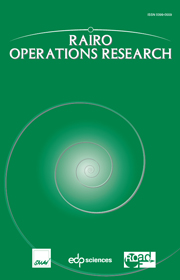Article contents
A Hybrid Approach Combining Local Search and Constraint Programming for a Large Scale Energy Management Problem∗
Published online by Cambridge University Press: 29 November 2013
Abstract
This paper presents a heuristic approach combining constraint satisfaction, local search and a constructive optimization algorithm for a large-scale energy management and maintenance scheduling problem. The methodology shows how to successfully combine and orchestrate different types of algorithms and to produce competitive results. We also propose an efficient way to scale the method for huge instances. A large part of the presented work was done to compete in the ROADEF/EURO Challenge 2010, organized jointly by the ROADEF, EURO and Électricité de France. The numerical results obtained on official competition instances testify about the quality of the approach. The method achieves 3 out of 15 possible best results.
- Type
- Research Article
- Information
- Copyright
- © EDP Sciences, ROADEF, SMAI 2013
References
- 4
- Cited by




